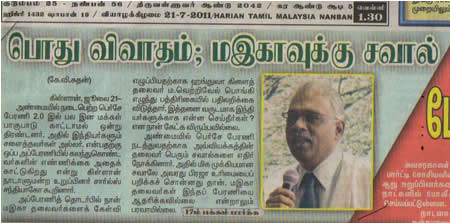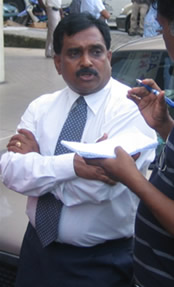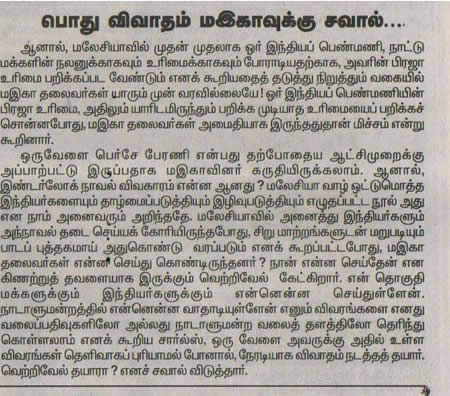
JULY 21 — In my many years as a journalist, one of the most
oft-asked questions I’ve put to interviewees who have business interests
here in Malaysia is: “What are some of the factors that have prompted
you to invest in Malaysia?”
The answers that I get, though not exactly the same every time, can
be summarised into one or more of the following major points: low costs,
multilingual workforce, skilled labour,
and political
stability. This was especially true in the heydays of the Multimedia
Super Corridor (MSC) Malaysia, when multinationals began pouring their
investments into Cyberjaya, building their shared services and
outsourcing centres there.
Thus, I
read with interest an
article last week which quoted our deputy minister of international
trade and industry as saying that one of the main features that
attracted investors to Malaysia was political stability.
He went on to say that it was “unfortunate” his ministry will now
have to rely on other “features” in its bid to promote the country,
especially coming off the back of last week’s Bersih 2.0 rally.
“The main question we receive is whether this [Bersih 2.0 rally] is a
common occurrence,” he was quoted last week in The Malaysian Insider as
saying. “Although it was a hiccup last Saturday, we tell investors that
it happens only very rarely.”
His responses got me thinking about a couple of things. Firstly, was
the Bersih 2.0 rally, which admittedly doesn’t happen frequently, a real
cause for concern as the deputy minister claimed? Secondly, what kind
of other “features” does he think the government can use to sell
Malaysia as an investment destination?
While I think it’s fair to say investors could have been marginally
concerned about the one-off street rally that happened last week, I do
not think that our position as an investment destination will be
affected by the fear of more street rallies in the future.
In fact, I think what’s more worrying to businesses are basic issues
affecting the nation’s economy as a whole. There are many fundamental
ones that can be highlighted but I think two will suffice.
The first must be the application of equitable and transparent
business practices at all levels of investments, especially in deals
that involve taxpayers’ monies. Now, there have been many instances when
the public
has read and heard through the grapevine, and no doubt experienced by
businessmen, of how the lowest priced and best submitted tenders aren’t
the ones which would eventually get the job.
Case in point:
The recent Light Rail Transit (LRT) extension project
in a so-called open tender exercise, which witnessed the Finance
Ministry committee ordering Syarikat Prasarana Negara Bhd to award the
deal to the Hartasuma Sdn Bhd-Bombardier joint venture, whose RM890
million bid is nearly 50 per cent higher than the lowest bid.
A source told
The Malaysian Insider that “all bids are
technically the same” but Prasarana had recommended Ingress Corp
Bhd-Balfour Beatty Rail Sdn Bhd, which put in a bid of RM610 million,
the lowest, against Hartasuma-Bombardier’s bid, which was the highest.
If indeed this were proven to be true, my question would be what
happened to the principle that there must be a “level playing field” in
order for true competitive practices to thrive and for the owner of the
project, in this case, the government, to be ensured of getting the best
value for its money on the said project?
Or are these kinds of deals awarded based on the age-old feudalistic
principle of, “It’s not what you know, but who you know?” instead of the
“May the best man win” principle? This case is just but one of the many
stories of how the best, most qualified tender submission, isn’t the
one that’s going to get the job.
Now wouldn’t any businesses wanting to deal here in Malaysia be more concerned with a level playing field than street rallies?
The second factor I believe investors are likely to be antsy about is
the systemic corruption and wastages that permeate all levels of
tenders in the country. For this, we only need to turn to the pages of
the Auditor-General’s report for the past few years to see for ourselves
how bad the wastages in Malaysia are.
A sample of these occurrences
include a set of four screwdrivers costing RM224; technical books
consisting 10 titles that had a price tag of RM10,700; a 3.1-megapixel
digital camera that was bought for RM8,254.
These figures speak for themselves. Surely this kind of practice
can’t inspire confidence in foreign investors to make Malaysia a
preferred investment destination, especially with other countries in the
region rising to challenge our competitiveness?
One can’t really know what the right honourable deputy minister meant
when he noted that we must use other “features” to make us more
attractive to investors.
But regardless of what he means, I do not think that there will be
any downside to making Malaysia a preferred investment destination if
the government begins first by addressing the two aforementioned points
before trying to do anything else to convince investors that are already
here to stay, or those who are thinking of investing.
Political stability can’t be just about the absence of perceived
disturbances and nuisance as a result of one rally. It must encompass
much more than just that; it should be about how the government of the
day allows free market principles to breed a competitive business
landscape through the execution of open and transparent business
practices instead of letting a feudalistic mentality continue to reign.
It must be about the eradication of systemic corruption, the plugging
of leakages and the elimination of wastages that will always end up
disrupting economic progress.
If the government is truly serious about selling Malaysia, start by
selling this feature — that it is committed to reform by being
transparent for all to see while tackling the hubris that exists in the
current system.
Do that, rather than simply making July 9, 2011 a convenient and
obvious scapegoat for the flagging inflow of investment into the
country.
This would be the best “feature” that will ultimately speak for
itself and convince investors to part with their money and park it here
in Malaysia.
* The views expressed here are the personal opinion of the columnist.

















 According
to Suaram director Cynthia Gabriel, immigration officials boarded the
aircraft and detained Bourdon after their plane touched down at KLIA in
Sepang this morning.
According
to Suaram director Cynthia Gabriel, immigration officials boarded the
aircraft and detained Bourdon after their plane touched down at KLIA in
Sepang this morning.











